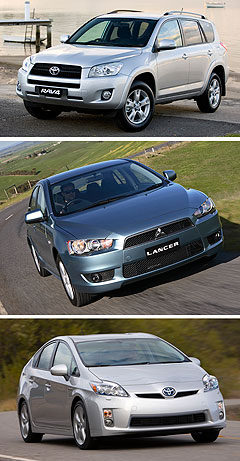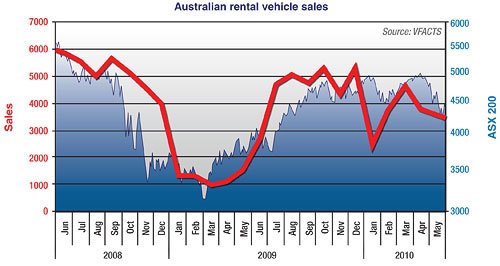Make / Model Search
News - General News - SalesRental companies have fingers on the pulseRent-a-fleet: Hyundai's Getz is staple of Australian rental car fleets. Car rental companies shift gears with the times to minimise economic fallout7 Jun 2010 NO ONE could accuse Australian car rental companies of being out of touch with prevailing economic sentiment. As soon as chill winds blow across the economic landscape, fleet buyers at the big rental companies slash their purchase orders in anticipation of fewer customers as business travellers and tourists go to ground in straightened times. And like turning on a tap, they return to the market to stock up again for the return migration of businessmen and tourists when the economic indicators head north. As the graph accompanying this report shows, the line tracing rental vehicle purchases over the past two years shows an uncanny resemblance to the fortunes of the Australian Stock Exchange’s ASX 200, presumably because vehicle buyers at the likes of Avis, Hertz and Europcar are sensitive to the same indicators as share traders. Like their counterparts in the stock market, rental car companies don’t want to get stuck with costly assets that earn little and depreciate lots in a recession, tearing a massive hole in the bottom line. Official VFACTS vehicle registration data shows that from a peak of more than 6000 vehicles a month in the halcyon days of the global boom in 2007, rental car purchases slid all the way to just 1081 in the depths of the global financial crisis, in March last year – a fall of almost 83 per cent. That was the same month that the ASX bottomed out on news of banking disasters in the United States and two of the world’s biggest motor companies, General Motors and Chrysler, filing for chapter 11 bankruptcy.  From top: Toyota RAV4, Mitsubishi Lancer and Toyota Prius. From top: Toyota RAV4, Mitsubishi Lancer and Toyota Prius.After last year’s massive sales trough, sales to rental companies clawed their way back to more than 5000 units a month at the end of last year when the federal government’s tax depreciation breaks were on offer, before falling away somewhat so far this year. Year to date, sales attributed to the rental segment have improved 177 per cent, to 18,386 units, compared with a mere 6623 for the same five months of 2009. Last month, 3618 new vehicles were signed on to rental fleets – a gain of 128 per cent over May 2009. Passenger cars make up about 80 per cent of rent-a-car sales in Australia, but like the market in general, these fleets have a growing appetite for SUVs, particularly the compact variety, reflecting demand from the punters. So far this year, SUV sales to rental fleets are up 303 per cent, to 1870 units year to date, from just 464 for the five months in 2009. In May, the percentage rise was even more impressive, up 529 per cent. Light commercials are also on the increase in rental purchases, up 135 per cent this year and 368 per cent in May. Car rental companies going into hibernation in tough times can compound problems for some local car manufacturers and importers who look to unload excess stock on rental companies at bargain basement prices when regular private and business customers desert them. A quick fleet deal can ease the pressure on stockholding yards bursting at the seams as vehicles roll in from the factory through a pipeline that cannot be so quickly switched off when sales drop off. But once the rental companies slam their chequebooks too, the car companies are out of luck. Even in the best of times, car-makers rarely – if ever – make a buck out of rental companies, which have massive buying power and hard noses. However, selling vehicles to a rental company has some compensation, beyond the obvious throughput that makes monthly sales figures look better and provides a few economies of scale for local car-makers. Benefits include ongoing parts and service business once the cars reach private hands via the auction houses, plus a marketing element whereby vehicles are exposed to a wider audience in the hope that the drivers might be so impressed that they buy one for themselves. Toyota, for example, has its hybrid Prius and Camry Hybrid on some rental fleets so customers can give them a weekend whirl. A scan of products on offer from the five biggest rental companies show that Hyundai, Toyota, Mitsubishi and Nissan nameplates are most common, with a sprinkling of Holdens, Fords, Mazdas – even Mercedes-Benzes, Audis and Minis. Understandably, Hyundai’s cut-price entry-level model, the Getz light car, is a staple of rental companies, along with its small-car sister, the i30, the Mitsubishi Lancer, Toyota Corolla, Camry, Yaris and RAV4, Holden Commodore and Statesman and Ford Falcon. Many of these vehicles have shown an up-tick in sales charts this year, in line with the fortunes of the market – including rental companies.  |
Click to shareGeneral News articlesResearch General News Motor industry news |









Facebook Twitter Instagram